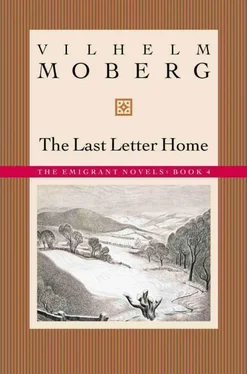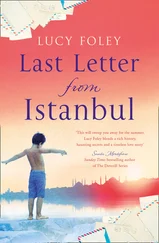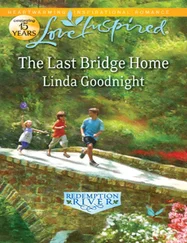He had lived and worked one day at a time, and thus the days had fled and gathered into one great, heavy pile: old age. And that pile pressed a person down to the ground. A day came when one was no longer useful, when one lived to no one’s joy, when one was only in the way here on earth, an annoyance to oneself.
When his good days of work were over, he became awkward, irresolute, stood there fumbling and helpless as if he had dropped something but hadn’t noticed how or when he lost it. He was closed out from the present and had nothing to hope for from the future.
This suddenly came over him one day when his life was near its end.
Charles O. Nelson lifted his head from the pillow and looked out. Loud laughter and mirth echoed from the new building — healthy, young exclamations, cries of joy from children’s throats. The little ones were playing among the fruit trees that had been planted round the new house.
Old Nelson’s grandchildren were playing in their home at the Nelson Settlement. The laborer who had gone home was lying here listening to still another generation. Their laughter and cries and noise disturbed him, yet the sounds were good to hear. They would not have been heard if he hadn’t lived.
Yes, those kids playing there were his grandchildren. His oldest son John and his Irish wife had presented him with four, and his daughter-in-law was carrying a fifth. Two of them were so redheaded one could almost fire kindling with their locks. Who could have imagined that he, the farmer from Småland, would become related to Stephen Bolle, the Irish miller at Taylors Falls. The first time John had seen the girl he was still so Swedish that he was called Johan. That was the time they had been caught in the blizzard and almost lost their lives. Johan had thought the girl, thumbing her nose, looked ugly as a troll. She had made faces at him and stuck out her tongue and he had been afraid of her. But later, when he met the miller’s wench after she was grown, she didn’t make faces at him but probably something much nicer. Anyway, he went almost crazy if he couldn’t see her every week. And when she finally moved in as mistress there was nothing left of the sniveling child at the mill.
Dorothy Bolle became young Mrs. Nelson, not half as angry and irritable a woman as her fire-flamed hair would lead one to believe. She had a mind of her own which both old and young Nelson respected, but father-in-law and daughter-in-law got along well as long as they didn’t interfere with each other’s business. Nor could they understand more than half of what one said to the other, they couldn’t meet through words. And people can’t fight if they don’t understand each other’s invective.
Mary — once known in Sweden as Lill-Marta, later as Marta — had borne him three grandchildren with her husband Klas Albert Persson, the storekeeper in Center City. These three were begotten by Swedish parents, Swedish brats all through, yet they weren’t half as lively and clever as the four Johan had with his Irishwoman. Nor were they as good-looking, whatever the reason was. Some people said there weren’t better traits than Swedish traits in all the world but they might be mistaken. Those half-Irish brats out there made a hell of a stir and noise, as bad as the Indians in the old days when they camped at the lake. If they couldn’t get along in the world no one could.
The third son, Dan, was still single; he had stayed on the farm to help his brother and probably would remain there. But Harald had gone into business in Minneapolis and had married a German girl; he had two children. Old Nelson had met the girl a few times but there weren’t many words he could exchange with her, for she mixed German with her English and he used Swedish words. But he felt that this daughter-in-law was a kind, quiet, and capable woman. She was fair, and reminded him in some way of his dead wife.
Frank lived in Chicago and had married an American woman. Frank had not yet helped make him a grandfather. But Ulrika had married a Norwegian farmer in Franconia and she had three kids and was probably carrying a fourth, as far as he could judge last time she was home. This Norwegian son-in-law was bull-headed and difficult. He was stubborn as hell, like most Norwegians. He always bragged that it was the Norwegians who had shot Charles XII.
Old Nelson would soon have a full dozen grandchildren if he counted those on the way. And they were begotten and sprung from the four different races. When the parents came to see him he would always lift up the grandchildren and put them on his knee; he wanted to make sure they were healthy and weighed as much as they should. The children were unlike and spoke differently, but this was not to wonder at: a Swedish father, an Irish mother, a Norwegian father, a German mother. What a mixed group of children they were! No one could guess they belonged to the same family. But they did have something in common: the same grandfather. He was the father’s father or the mother’s father for all of them. Through Charles O. Nelson, the old one in the old house, these human plants were linked together.
When he emigrated his father had reproached him: You drag my family out of the country. Today he understood better than at that time what his father had meant: You take with you also coming generations and decide their fate; you decide for both the living and the unborn. If Nils Jakob’s Son now could have seen the great flock of his great-grandchildren at the Nelson Settlement he might have said: Karl Oskar, you have not only dragged my family out of the country, you have also mixed up my descendants with foreign races. In these brats not much is left of my race.
And the Lord only knew what might come of all this mixture of people with different roots from different lands. Would they form a race of their own? But there was no use speculating about this, he himself would soon be gone. At the most for only a few years he would see his grandchildren play around the house. Already a third generation was shooting up from his root, and soon the world would spin its turn without the originator of this family, without the old one in the old house. Nothing would change when he disappeared. People returned to dust every moment and nothing would change when his turn came.
Charles O. Nelson listened, annoyed and pleased, to the hubbub his grandchildren raised down in the yard. Undoubtedly they were up to something, perhaps ruining the new saplings his boys had planted last spring. He was proud of these new plum and cherry trees, he felt responsible for them in some way. They were tender yet could easily be broken; those kids should get a good spanking if they hurt them.
He could hear his son’s woman yell at the children; Stephen Bolle’s girl had a strong, piercing voice, but he couldn’t understand a word she said, she must be talking Irish. She and Johan shouldn’t be so soft with the children.
His own children hadn’t entirely forgotten their mother tongue. If they wanted to they could speak it. He reproached himself that he could no longer speak his native language well; when some newcomer arrived from Småland he realized how much he had forgotten. How could a man’s tongue change so much that he no longer could use words clearly which he had spoken thousands of times?
He looked up at the old creaking clock on the other wall. Only a quarter past two. Still many hours till evening and blessed sleep. But tonight it would be hard to sleep, the ache was coming alive. For a day or two his back would be all right, and then it would start again. The ache sat like an auger in his back, it had its home there, its designated place which it never left. The auger’s sharp, steel edge turned steadily, inexorably. It was drilling a hole in his back, but one that it never finished.
Читать дальше












